
Museveni’s election to lose
According to the survey, Yoweri Museveni, the incumbent holds a nearly three-in-one lead over closest challenger, Robert Kyagulanyi Ssentamu, among registered voters willing to declare their voting intentions ahead of Election Day. However, many respondents refused to say who they intended to vote. “So the final outcome may be much closer,” the survey says.
According to the survey findings, 53% of the respondents who self-identified as registered to vote said they would cast their ballots for Museveni who won 60.75% of the vote in 2016.
About one in five respondents (18%) favoured the pop-star-turned politician, Bobi Wine whose real name is Kyagulanyi Robert Ssentamu. But a quarter of the respondents refused to disclose how they intend to vote.
Dr. Frederick Golooba-Mutebi, the Afrobarometer national investigator for Uganda told The Independent shortly after the release of the survey that it is intriguing to see that even people who intend to vote the incumbent; there is not much trust for the Electoral Commission producing credible results.
Golooba-Mutebi also noted the survey finding that almost a quarter of the respondents are unwilling to reveal who they are going to vote for
“They credit the EC for carrying out a good voter registration exercise but still doubt if the EC can produce a credible election. For me that poses the question; why do they think the EC cannot produce a credible result given that they are supporters of a sitting government?” he said.
Golooba-Mutebi also noted the survey finding that almost a quarter of the respondents are unwilling to reveal who they are going to vote for.
“I think that in many cases that would suggest that they are probably going to vote for candidates other than the incumbent president,” he said.
“And if it’s 26%, who are they going to vote for? This survey also shows that there is likely to be a huge turn-out on Election Day.”

“People were very keen to register and people say they are going to go and vote. In many cases, in highly contested campaigns; if the voter turn-out is high, it usually suggests that the opposition candidates are going to win more votes than normal.”
Golooba-Mutebi said it is like giving birth to a child and not being sure that this child will grow into an adult; it doesn’t stop you from having a child because you want the child anyway. Whether the child grows into an adult or not is beyond your control.
“It’s the same thing for Ugandans,” he said, “they want to vote for candidates of their choice and they keep hoping that may be this time they will get the right result but deep down they don’t think that that is likely given the environment.”
- Among the 84% of respondents who said they were registered to vote, more than half (53%) indicated they would vote for Museveni and the National Resistance Movement (NRM) party.
- About one in five (18%) said they would cast their ballots for Bobi Wine and his National Unity Platform (NUP) party. The other nine candidates combined get 5%.
- One in four registered voters refused to answer the question (22%) or said they did not know how they would vote (2%)
- When asked who they thought would win the election, regardless of their own intentions, a large majority (57%) predicted victory for Museveni, compared to 21% for Bobi Wine.
- Support for the challenger was stronger in urban areas (26% for registered voters, vs. only 15% in rural areas) and among younger Ugandans (24% of 18-35 year olds). Even among these groups, Museveni outpaced his challenger (35% in urban areas, 45% of younger voters) though undeclared voters add a degree of uncertainty.
- In the Parliamentary election, among registered voters, 52% say they plan to vote for the NRM candidate, while 29% identified another party. But 18% do not voice their preference (16% refused, 2% said they “don’t know”).
Divided Parliament
The parliamentary vote mirrored the presidential vote fairly closely in terms of party preferences. Depending on how those who would not reveal their preference break, the Uganda Parliament could be quite closely divided after the upcoming election.
While this suggests that the NRM is likely to retain control of Parliament, if the “quiet voters” break more strongly for the opposition, as one might expect in the current campaign environment, the NRM could end up with at best a slim margin of control (compared to its two-thirds majority in the current Parliament).
Charity Ahimbisibwe, the executive director of the Citizens Coalition for Electoral Democracy (CCEDU), an alliance that brings together hundreds of civil society organisations in the country said the Afrobarometer survey findings have helped them put numbers on some of the issues they have been crusading and teaching citizens about during the electoral campaign period.
But she questioned the statistics that noted that candidates feel more poorly treated by the EC than the security forces.
Ahimbisibwe said the reverse couldn’t be more true considering the fact the security forces seem to have taken over the electoral process to the extent that even when the EC wrote to the Inspector General of Police Martin Okoth Ochola in December following complaints of harassment and mistreatment by opposition presidential candidates, Ochola asked the EC Chairperson, Simon Byabakama, to produce evidence.
About 2021 Uganda General Elections:
General elections will be held in Uganda on 14 January 2021 to elect the President and the Parliament.
Incumbent President Museveni, who has ruled the country since 1986, is seeking re-election.
Other presidential candidates include opposition leader and former pop-star, 38-year-old Bobi Wine of the National Unity Platform, John Katumba, Willy Mayambala, Fred Mwesigye, Henry Tumukunde, Joseph Kabuleta, Nancy Kalembe, Patrick Oboi Amuriat, Mugisha Muntu and Norbert Mao.
FULL POLL
Uganda 2021 Elections Afrobarometer Poll by jadwongscribd on Scribd
 The Independent Uganda: You get the Truth we Pay the Price
The Independent Uganda: You get the Truth we Pay the Price





